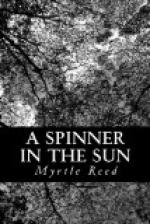“Sometimes I’m thinking that there may be tunes and tunes. I was once in a place where there were many instruments, all playing at once, and there was nothing came from it that one could call a tune. But ’t was great and beautiful beyond any words of mine to tell you, and the master of them all, standing up in front, knew just when each must play.
“Most, of course, I watched the one who played the flute and listened to the voice of it. ’T is strange how, if you listen, you can pick out one instrument from all the rest. I saw that sometimes he did not play at all, and yet the music went on. Sometimes, again, he was privileged to play just a note or two—not at all like a tune.
“’T was just his part, and, by itself, it would have sounded queer. I might have laughed at it myself if I did not know, and was listening for a tune. But the master of them all was pleased, because the man with the flute made his few notes to sing rightly when they should sing and because he kept still when there was no need of his instrument.
“So I’m thinking,” concluded the Piper, humbly, “that these few notes of mine may belong to something I cannot hear, and that the Master himself leads me, when ’t is time to play.”
He put the instrument to his lips and began to play softly. The low, sweet notes were, as he said, no evident part of a tune, yet they were not without a deep and tender appeal.
Evelina listened, her head still bowed. It did not sound like the pipes o’ Pan, but rather like some fragment of a mysterious, heart-breaking melody. Faint, far echoes rang back from the surrounding hills, as though in a distant forest cathedral another Piper sat enthroned.
The sound of singing waters murmured through the night as the Piper’s flute breathed of stream and sea. There was the rush of a Summer wind through swaying branches, the tinkle of raindrops, the deep notes of rising storm. Moonlight shimmered through it, birds sang in green silences, and there was scent of birch and pine.
Then swiftly the music changed. Through the utter sadness of it came also a hint of peace, as though one had planted a garden of roses and instead there had come up herbs and balm. In the passionate pain, there was also uplifting—a flight on broken wings. Above and beyond all there was a haunting question, to which the answer seemed lost.
At length the Piper laid down his flute. “You do not laugh,” he said, “and yet I’m thinking you may not care for music that has no tune.”
“I do care,” returned Evelina.
“I remember,” he answered, slowly. “It was the day in the woods, when I called you and you came.”
“I was hurt,” she said. “I had been terribly hurt, only that morning,”
“Yes, many have come to me so. Often when I have played in the woods the music that has no tune, some one who was very sad has come to me. I saw you that day from far and I felt you were sad, so I called you. I called you,” he repeated, lingering on the words, “and you came.”




